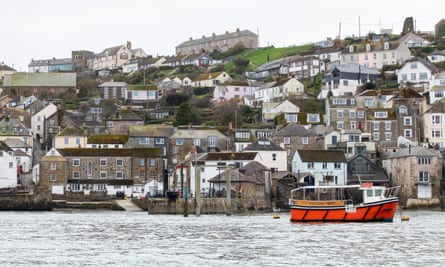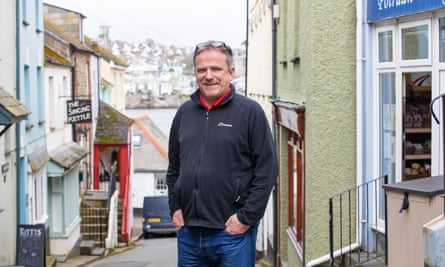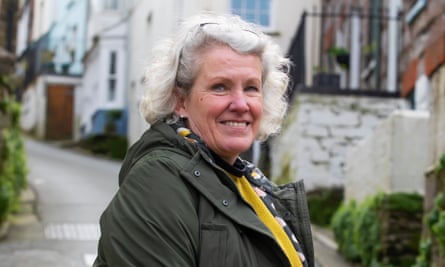‘We’re on a cliff edge’: Cornish village where 52% of houses are not first homes
The C Toms & Son boatyard in Polruan is a busy hub of activity in an otherwise ghostly harbourside.
Its owners, father and son Allen and Paul Toms, put the eeriness in the otherwise picturesque Cornish village down to one thing: holiday lets and second homes.
On Wednesday, the chancellor, Jeremy Hunt, announced plans to curtail tax breaks given to landlords of holiday lets in an effort to boost the supply of long-term rentals in places such as Polruan – but Allen and Paul are not convinced it will work.
The furnished holiday letting (FHL) regime allows the owners of about 127,000 properties to deduct the full cost of their mortgage interest payments from their rental income and, potentially at least, pay lower capital gains tax when they sell.
This FHL scheme has now been scrapped, meaning a holiday let landlord who earns £30,000 in rent will have to pay about £4,000 a year extra in income tax. The theory is that it will encourage landlords to consider long-term rentals, boosting this housing stock and reducing prices for local people.

Recent research by the Lanteglos by Fowey parish council found that a staggering 52% of the houses in Polruan are second homes or holiday rentals.
Allen, 79, who now lives over the harbour in Fowey, and Paul, 51, who has lived in Polruan his whole life, have seen the area change significantly.
“Years ago, Polruan had a rowing team, football team, youth club,” Allen says.
“We as a business, if we advertised for an apprentice we would have youngsters applying, now we have nothing. Can’t get them.”
This is down to second homes, he says, which create a situation where younger workers and their families cannot afford to live in Polruan.
On the measures in the budget, Allen says: “If they can afford a second home, they can afford to pay more tax. But he’s only tinkering. It’s not going to do anything, he’s going to tinker. He’s going to give someone a little bit, and take from someone else.”
Allen took the unusual step of buying a property in the village to accommodate men interested in working for the boatyard.
His son, Paul, has a child at the local primary school, which has seen its numbers dwindle from 75 in 2013 to 23 now.
“Every winter it gets quieter,” Paul says. “Because obviously the older generation are passing and youngsters can’t afford to live here.”
Paul’s son is working as an apprentice in the boatyard but he fears his son will not be able to afford to live in Polruan.
Paul is not convinced the chancellor’s steps will make an impact.
“I imagine there’s a load of people in London looking on Rightmove right now thinking: ‘I’ll have that one.’”

Gini Ainley, who moved to Polruan four years ago from Winchester, has since retired from a career in project management and is now a parish councillor in the village.
The council’s survey of the village established that of the 572 properties in Polruan, 166 are permanent homes or social housing and 12 are long-term rentals.
“The people that are second home owners come down regularly, and they really are part of the local community,” she says.
“And obviously rentals are important because they do bring in revenue to our beautiful village.
“Having said that, we probably are on a bit of a cliff edge now with that sort of proportion. Some of the issues have been – particularly just before the pandemic – that we’ve lost about 28% of our social housing, and quite a few – I think at least five – properties are now second homes or rental properties, or holiday rentals.”
Ainley says there are even cases of no-fault evictions from properties which are now bought as second homes.
“These properties are very important particularly if they can be rented by either elderly people or young people. We’re definitely at a stage where we think as a council we should do something about particularly the Airbnb-type rentals, the ones that just suddenly spring up.”
On what the government should be doing to alleviate the issue, Ainley said the lack of council housing was a “major issue”.
“We haven’t built anything for years,” she says.

Graham Morris, 55, took over Polruan Village Store five months ago after moving from Callington, a Cornish town farther east.
The shop was on the brink of closure before Morris took over and many residents are grateful to him for saving the business.
Morris has his own ideas for tackling the impact that the second homes and holiday lets have on the local economy.
“I believe there should be some form of contribution to local businesses,” he says.
“If that was then evenly distributed throughout the businesses during the winter months and the difficult months, that would allow them to pay themselves and their staff.”
Is this a form of additional tax on second home owners? “Yes, but it would be controlled locally and distributed locally, not held in a central pot by government.”
Many in the village describe it as a “ghost town” in winter. Most understand the seasonal cycle is the model they signed up to, but it is getting harder.
“This is our first winter. We were told it’s going to be quiet in the village, and the village has been very supportive of us so we know we’re going to be OK – but I haven’t paid myself [for] five months.”

Suzanne Goddard, 60, who moved to Polruan with her husband 10 years ago from near Leamington Spa, said: “It needs to be balanced. I don’t know what the solution is. The holiday trade is vital for the village.
“In the time we’ve been here the demographic has changed, there are fewer people that live and work in the area.”
Goddard said there were more second – or even third – homes in the village that are noticeably left empty for most of the year.
On the measures announced in the budget, Goddard said: “I’m not sure it will make a difference.”